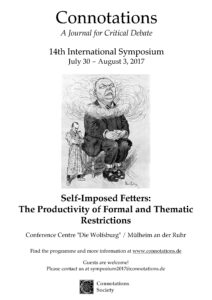Self-Imposed Fetters

T. S. Eliot [states] (in “Reflections on Vers Libre”) that “there is no freedom in art. And as the so-called vers libre which is good is anything but free, it can better be defended under some other label” (32). Similarly, William Carlos Williams confessed in his autobiography: “Free verse wasn’t verse at all to me. All art is orderly” (65). These statements do not expressly tell us that the imposition of order contributes to the poet’s creativity, but implicitly, e.g. by Eliot’s epithet “good,” they take us nearer to our paradox: what is good is “anything but free,” and if we do not take this statement as a praise of restrictions for their own sake we must see it as advocating restrictions as a source of something else, poetic quality. This quality is a mark of what is “good,” of what is really “art.” […] What is needed is exactly the right kind and degree of restriction so as to prevent literature from becoming a mere mechanical game on the one hand and a mere will-o’-the-wisp on the other. Let us try and find out more about this optimal effect.
From: Matthias Bauer, “Self-Imposed Fetters: The Productivity of Formal and Thematic Restrictions”
Articles in this special issue
- Self-Imposed Fetters: The Productivity of Formal and Thematic Restrictions
Matthias Bauer
Connotations Vol. 27: 1-18 - “[M]emories and similes laid side by side”: The Paratactic Poetics of Alice Oswald’s Memorial1)
Lena Linne
Connotations Vol. 27: 19-47 - Community and Conflict: A Practitioner’s Perspective on Verse Drama
Richard O' Brien
Connotations Vol. 27: 120-54 - More Context and Less: A Response to Lena Linne and Burkhard Niederhoff
Carolin Hahnemann
Connotations Vol. 28: 42-64 - God’s Mending: Formal and Spiritual Correction in George Herbert’s “Deniall” and Henry Vaughan’s “Disorder and frailty”
Jonathan Nauman
Connotations Vol. 28: 112-27 - Self-Imposed Fetters in Four Golden Age Villanelles
Frank J. Kearful
Connotations Vol. 28: 163-91